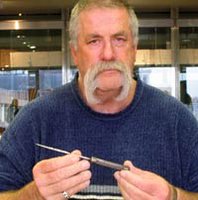my lobotomy
 Today on NPR there was an amazing story. While I am an admitted NPR-junkie and enjoy a lot of the unique stories they offer up each day, this story was quite a standout. It was simply titled 'My Lobotomy', one man's story of having a transorbital (or "icepick") lobotomy performed on him 45 years ago, at the tender age of 12.
Today on NPR there was an amazing story. While I am an admitted NPR-junkie and enjoy a lot of the unique stories they offer up each day, this story was quite a standout. It was simply titled 'My Lobotomy', one man's story of having a transorbital (or "icepick") lobotomy performed on him 45 years ago, at the tender age of 12.The 22-minute piece is narrated by Howard Dully, the lobotomy patient mentioned above, and is quite captivating. For those of you unfamiliar with the procedure, it was brought to the U.S. in 1946 by psychiatrist Walter Freeman and touted as a treatment for mental illness, though it eventually grew into a so-called "cure all". The procedure involves inserting an icepick through the patient's eye sockets, one at a time, and moving it around the brain like one would scramble eggs. Freeman believed that mental illness was caused by overactive emotions, which would be eliminated by this procedure.
Over the years, Freeman performed over 2,500 of the procedures, with mixed results. Some subjects were successfully "cured", while others got worse, and some even died. But Freeman stood behind the procedure until it was almost rendered obsolete overnight when the first psychiatric drugs to come to market.
Dully was fortunately a survivor of the procedure with no noticeable side effects, besides the trauma and shame he has felt ever since. In this story, he interviews other physicians, families of other patients, and even confronts his own father on why he did this to him. This is storytelling at it's best.
Listen to the story here, via NPR.org.
11/17/2005 12:35 PM
Wow, that is REALLY powerful. what a great story!
11/17/2005 8:16 PM
i haven't even listened and i'm captivated
12/31/2005 4:04 AM
Thanks for listening
Howard